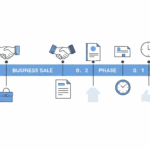Selling a service business requires careful planning and preparation. From timing the sale to valuing your business and finding prequalified buyers, there are several key steps to navigate. In this guide, we will explore the essential factors to consider when selling a service business and provide expert tips and insights to help you achieve a successful sale.
Key Takeaways:
- Selling a service business involves careful planning and preparation.
- Timing the sale is crucial for maximizing value and attracting potential buyers.
- Proper valuation is essential for setting a fair selling price.
- Financial preparation, including comprehensive records, is crucial for a smooth sale process.
- Boosting your service business sales and maintaining customer satisfaction can attract potential buyers.
Timing of the Sale
The timing of the sale plays a crucial role in the success of selling a service business. To ensure optimal results, it is recommended to begin preparing for the sale at least two to three years in advance. This allows sufficient time to make necessary upgrades and improvements, strengthening the business’s financial records, client lists, and overall framework.
By upgrading financial records, you can showcase the business’s profitability and growth, making it more attractive to potential buyers. This includes organizing and verifying financial statements, tax returns, and other relevant documentation. Having accurate and up-to-date financial records not only boosts buyer confidence but also facilitates a smooth transition during the sale process.
Additionally, staying up-to-date with market trends is vital for selling a service business at the right time. Keep a close eye on industry developments and changes, as well as fluctuations in the overall market conditions. Selling during a favorable market period can significantly increase the chances of attracting qualified buyers and obtaining a better selling price.
To summarize, optimal timing to sell a service business requires careful preparation and attention to detail. Preparing the business well in advance, upgrading financial records, and staying informed about market trends are all essential steps to ensure a successful sale.
The Importance of Preparing Financial Records
One of the key aspects of preparing for a business sale is the accuracy and organization of financial records. Prospective buyers will want to review the business’s financial performance and projections, and having well-prepared financial records can instill confidence and trust. Upgrading financial records involves:
- Ensuring all financial statements are accurate and up-to-date
- Verifying tax returns and other financial documents
- Compiling a comprehensive list of assets and liabilities
- Preparing a cash flow statement to demonstrate the business’s financial health
By taking the time to prepare these financial records, you can make your service business more attractive to potential buyers and facilitate a smoother due diligence process.
“Well-prepared financial records can instill confidence and trust in potential buyers.”
| Size of Business | Multiplier |
|---|---|
| Small | 2-3 times the profit |
| Medium | 3-5 times the profit |
| Large | 5-10 times the profit |
Selling price multipliers for service businesses are typically based on the size and industry they operate in. Small businesses generally average a selling price of 2-3 times the profit, while medium-sized businesses can reach 3-5 times the profit. Larger service-based businesses have the potential to achieve a selling price of 5-10 times the profit, depending on various factors such as industry competitiveness and growth potential.
Getting the Proper Valuation
Properly valuing your service business is essential for selling at a fair price. Business valuation takes into account various factors, including the quality of clients, the prominence of the trade name, and the current asset value. Auditors consider variables such as stock, sales, debt, and company assets to establish opportunities and determine a reasonable selling price.
The value of service businesses generally exceeds the profit by 2-10 times, depending on the industry and size of the business. Small businesses typically average 2-3 times the profit, medium-sized businesses can reach 3-5 times the profit, and large service-based businesses can achieve 5-10 times the profit.
Factors Affecting Business Value
Several key factors can influence the value of your service business:
- The industry: Certain industries may command higher valuations due to their growth potential, market demand, or unique expertise required.
- Profitability: The financial performance of your business, including revenue, costs, and profit margins, can significantly impact its value.
- Client base: The quality of your clients, recurring revenue streams, and customer loyalty can increase the attractiveness and value of your business.
- Intellectual property: Patents, trademarks, copyrights, or proprietary knowledge can add value by differentiating your business and protecting its competitive advantage.
- Market conditions: External factors such as economic trends, industry outlooks, and market demand can affect the perceived value of your business.
Consider these factors when determining the valuation of your service business to ensure a fair and successful sale.
Financial Preparation
Adequate financial preparation is crucial when selling a service business. By presenting comprehensive financial records, you can instill confidence in potential buyers and demonstrate the value of your business. Here are key steps to ensure you have the necessary financial documentation to smoothly navigate the sale process:
Gather Financial Records
Begin by collecting financial records for the past three years, including:
- Profit and loss statements
- Balance sheets
- Tax returns
These records provide an accurate snapshot of your business’s financial health and performance over time.
Document Business Assets and Liabilities
Make a comprehensive list of all your business’s assets and liabilities. This includes:
- Equipment
- Stock
- Intellectual property
- Other intangible assets
Presenting this information to potential buyers helps them understand the tangible and intangible value they are acquiring.
Create a Cash Flow Statement
A cash flow statement provides a clear picture of your business’s inflows and outflows of cash over a specific period. It demonstrates your business’s ability to generate cash and manage expenses. Consider working with an accountant to create a compelling cash flow statement that highlights your business’s financial stability and growth potential.
“Accurate and well-presented financial records enhance the credibility of your service business and attract serious buyers.”
– Financial Expert
Prepare a Business Operation Manual
Document how your service business is run in a business operation manual. Include standard operating procedures, customer management processes, marketing strategies, and any other relevant information. This manual showcases your business’s turnkey operation, making it an attractive investment for potential buyers.
By prioritizing financial preparation and ensuring your records are organized and accurate, you can effectively present the value of your service business to interested buyers.
| Financial Preparation Checklist |
|---|
| Gather financial records for the past three years |
| Document business assets and liabilities |
| Create a comprehensive cash flow statement |
| Prepare a business operation manual |
Boosting Your Service Business Sales
Increasing revenue and maintaining customer satisfaction are crucial aspects of selling a service business. To achieve these goals, it is essential to implement effective marketing strategies and optimize your business operations. By working with professionals, leveraging market trends, and enhancing your online presence, you can attract potential buyers and maximize the value of your service business.
Streamlining Operations with Professionals
To improve service business sales, it is beneficial to work with professionals such as accountants, lawyers, and business brokers. These experts can provide valuable insights to optimize your operations, identify areas for improvement, and enhance profitability. They can also guide you through the sales process and ensure compliance with legal and financial requirements.
Aligning with Market Trends and Industry Growth
Market trends and industry growth play a significant role in attracting buyers and increasing revenue for service businesses. Stay up-to-date with the latest trends, technologies, and consumer preferences in your industry. By adapting your offerings and marketing strategies to meet market demands, you can stay ahead of the competition and position your business for growth.
Enhancing Online Presence and Utilizing Social Media
Establishing a strong online presence is crucial for service businesses. Develop a professional website that showcases your services, expertise, and client testimonials. Utilize social media platforms such as Facebook, Instagram, and LinkedIn to engage with your target audience, share valuable content, and promote your business. Implement effective digital marketing strategies, such as search engine optimization (SEO) and targeted advertising, to reach potential customers.
Building a Strong Brand Identity
A strong brand identity can differentiate your service business from competitors and attract loyal customers. Develop a compelling brand message and visual identity that resonates with your target audience. Consistently communicate your brand values and unique selling propositions across all marketing channels. By building a strong brand, you can enhance customer loyalty and increase sales.
Developing an Exit Strategy in Your Business Plan
When selling a service business, it is essential to have a well-defined exit strategy in your business plan. Potential buyers are often interested in businesses that offer long-term growth and scalability. Outline your plans for future expansion, diversification, and profitability in your business plan. By demonstrating a clear vision for the future, you can attract buyers who are seeking sustainable success and growth.
By implementing these strategies and focusing on improving service business sales, you can not only increase revenue but also enhance customer satisfaction and attract potential buyers. Remember to adapt and refine your approach based on market dynamics and consumer demands to maximize the value of your service business.
Using a Business Broker
Deciding whether to use a business broker in selling a service business depends on various factors. While selling the company yourself can save money, hiring a broker can provide valuable expertise and support throughout the sales process.
Benefits of Using a Business Broker:
- Expertise and Support: Brokers assist in negotiation, due diligence, and business evaluation, ensuring a smooth and successful sales process.
- Access to a Broader Pool of Buyers: Brokers have connections and resources to reach a wider range of potential buyers, increasing the chances of finding the right match for your service business.
- Leveraging Financial Institution Connections: Brokers can leverage their relationships with financial institutions to facilitate buyer financing options, making it easier for potential buyers to secure funding.
- Confidentiality and Discretion: Brokers maintain confidentiality throughout the sales process, protecting sensitive business information and ensuring a discreet transaction.
Working with a Business Broker:
- Research and Choose a Reputable Broker: Take the time to research and select a qualified and experienced business broker who specializes in your industry and has a proven track record of successful sales.
- Establish Clear Communication and Expectations: Clearly communicate your goals, expectations, and timeline to the broker, ensuring they understand your specific needs and objectives.
- Collaborate on Pricing and Negotiation: Work closely with the broker to determine the optimal selling price and negotiate favorable terms that align with your goals.
- Engage in Due Diligence: Collaborate with the broker during the due diligence process, providing necessary documents and information for potential buyers to conduct thorough inspections and assessments.
Business Broker Fees:
The fees for hiring a business broker vary based on several factors, including the size and complexity of the business, the experience of the broker, and the specific services provided. Some brokers charge a flat fee, while others work on a commission basis, typically ranging between 5% and 12% of the total sale price. It is essential to discuss and determine the fee structure upfront to align expectations.
Considering the benefits and expertise a business broker can bring, it is worth exploring this option to maximize the value and successful sale of your service business.
Finding Prequalified Buyers
Finding prequalified buyers is crucial in the sale of a service business. It can take anywhere from six months to two years to attract suitable buyers. Strong advertising and maintaining communication with potential buyers are essential. Have multiple buyers in place in case the initial deal falls through. Ensure that interested parties have prequalifications for funding before disclosing company details. Consult with a lawyer or accountant regarding financing options. The sale price is determined by the business’s revenue and profitability. Thorough due diligence is necessary for both parties before finalizing the sale.
Qualifying Buyers for a Business Sale
When it comes to selling a service business, qualifying buyers is an important step to ensure a successful sale. The process involves assessing potential buyers’ financial capabilities, experience, and compatibility with the business. Look for buyers who have a proven track record in the industry and possess the necessary resources to take over and grow the business. Performing thorough background checks and requesting financial statements can help gauge their preparedness to acquire the business.
Attracting Interested Buyers
Attracting interested buyers requires effective marketing strategies and a compelling presentation of your service business. Develop a comprehensive marketing plan that includes online and offline channels to reach a wide audience. Highlight the unique selling points of your business, such as a loyal customer base, quality services, or a strong brand reputation. Use social media platforms, professional networks, and industry events to create awareness and attract potential buyers.
Negotiating the Sale Terms
The negotiation phase is critical in finalizing the sale of your service business. Clearly define your priorities and desired terms, such as the sale price, payment structure, and transition period. Be prepared to compromise and find a mutually beneficial agreement. Consider hiring a skilled negotiator or involving a business broker to assist in the negotiation process. Remember, open communication and flexibility are key to reaching a successful outcome.
Due Diligence in Business Sale
Before completing the sale, both the buyer and seller must conduct due diligence to ensure a smooth transition and minimize potential risks or legal issues. Due diligence involves a thorough examination of the service business’s financial records, contracts, legal obligations, employee agreements, and any potential liabilities. Engage legal and financial professionals to assist in the due diligence process and address any concerns or discrepancies that may arise. This step is crucial for protecting both parties’ interests and ensuring a successful business sale.
| Steps to Finding Prequalified Buyers | Benefits |
|---|---|
| 1. Implement strong advertising strategies |
|
| 2. Maintain communication with interested parties |
|
| 3. Have backup buyers in place |
|
| 4. Verify buyers’ prequalifications for funding |
|
“Finding the right buyer is like finding the perfect match for your service business. Take the time to qualify potential buyers and ensure they share your vision and values. A successful sale depends on the right fit.”
Conclusion
Selling a service business requires careful planning, preparation, and attention to detail. By following these essential steps and utilizing the expertise of professionals, you can navigate the sale process with confidence. Remember to focus on timing, valuation, financial preparation, sales growth, and finding qualified buyers. With proper execution, you can achieve a successful sale and maximize the value of your service business.








